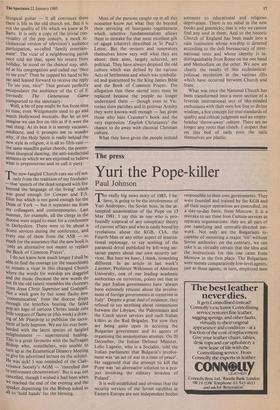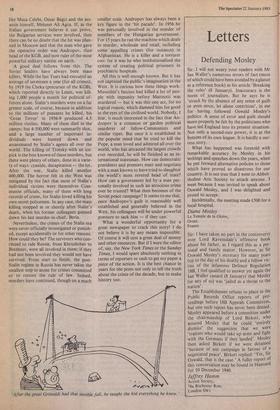The press
Yuri the Pope-killer
Paul Johnson
The really big news story of 1983, I be- lieve, is going to be the involvement of Yuri Andropov, the Soviet boss, in the at- tempted assassination of the Pope on 13 May 1981. I say this as one who is pro- foundly sceptical of any conspiracy theory of current affairs and who is easily bored by revelations about the KGB, CIA, the Fourth Man or any other aspect of interna- tional espionage, to say nothing of the paranoid drivel published by left-wing sec- tarian papers about our own security ser- vices. But here we have, I think, something different. In an article in last week's Listener, Professor Wilkinson of Aberdeen University, one of our leading academic authorities on terrorism, points out that in the past Italian governments have 'always been extremely reticent about the involve- ment of foreign governments in terrorism in Italy'. Despite a great deal of evidence, they refused to say anything about connections between the Libyans, the Palestinians and the Czech secret services and such Italian killers as the Red Brigades. Yet now they are being quite open in accusing the Bulgarian government and its agents of organising the assassination attempt. On 20 December, the Italian Defence Minister, Lelio Lagorio, who is a Socialist, told the Italian parliament that Bulgaria's involve- ment was 'an act of war in a time of peace'. He suggested that the attempt to kill the Pope was 'an alternative solution to a pro- ject involving the military invasion of Poland'.
It is well-established and obvious that the security services of the Soviet satellites in Eastern Europe are not independent bodies
responsible to their own governments. They were founded and trained by the KGB and all their major operations are controlled, on a day-to-day basis, from Moscow. It is a mistake to see these Iron Curtain services as separate organisations: they are all part of one ramifying and centrally-directed net- work. Not only are the Bulgarians in- capable of mounting a major 'hit' without Soviet authority: on the contrary, we can take it as virtually certain that the idea and the instructions for this one came from Moscow in the first place. The Bulgarians were merely comparatively low-level agents, just as these agents, in turn, employed men like Musa Celebi, Omar Bagci and the ass- assin himself, Mehmet Ali Agca. If, as the Italian government believes it can prove, the Bulgarian services were involved, then there can be no doubt that the hit was plan- ned in Moscow and that the man who gave the operative order was Andropov, then head of the KGB, and now ruler of the most powerful military nation on earth.
A good deal follows from this. The Soviet leaders have always been mass killers. While the last Tsars had executed an average of seventeen a year (for all crimes), by 1919 the Cheka (precursor of the KGB), which reported directly to Lenin, was kill- ing 1,000 people a month for political of- fences alone. Stalin's murders were on a far greater scale, of course, because in addition to the millions of peasants he killed, his `Great Terror' in 1936-9 produced 4.5 million victims. Many of them died in the camps; but 4-500,000 were summarily shot, and a large number of important in- dividuals were hunted down and assassinated by Stalin's agents all over the world. The killing of Trotsky with an ice- pick is the best known of these murders, but there were plenty of others, done in a varie- ty of ways: cyanide, decapitation — the lot. After the war, Stalin killed another 400,000. The horror felt in the West was mitigated by the fact that most of Stalin's individual victims were themselves Com- munist officials, many of them with long records of crime, for Stalin loved killing his own secret policemen. In any case, the mass killing stopped at or shortly after Stalin's death, when his former colleagues gunned down his last murder-in-chief, Beria.
Nevertheless, the crimes of the Stalin era were never officially investigated or punish- ed, except accidentally or for other reasons. How could they be? The survivors who con- tinued to rule Russia, from Khrushchev to Brezhnev, were all involved in them: if they had not been involved they would not have survived. From start to finish, the post- Stalin regime in Russia has never taken the smallest step to atone for crimes committed or to restore the rule of law. Indeed, murders have continued, though on a much smaller scale. Andropov has always been a key figure in the 'hit parade'. In 1956 he was personally involved in the murder of members of the Hungarian government. For 15 years he ran the machine which deals in murder, wholesale and retail, including some appalling crimes (for instance) in Afghanistan. He is a killer and a torturer too: for it was he who institutionalised the system of treating political prisoners in psychiatric hospitals.
All this is well enough known. But it has not captured the public's imagination in the West. It is curious how these things work. Mussolini's fascists had killed a lot of peo- ple with impunity before Matteotti was murdered — but it was this one act, for no logical reason, which damned him for good in the eyes of the civilised world. Nobody, I fear, is much interested in the fact that An- dropov is a common or garden political murderer of fellow-Communists and similar types. But once it is established in the popular mind that he tried to kill the Pope, a man loved and admired all over the world, who has attracted the largest crowds ever recorded, he will be finished as an in- ternational statesman. How can democratic presidents and premiers meet and negotiate with a man known to have tried to slaughter the world's most revered head of state? How can a government led by a man per- sonally involved in such an atrocious crime ever be trusted? What then becomes of the Soviet peace campaign? It seems to me that, once Andropov's guilt is reasonably well established and generally believed in the West, his colleagues will be under powerful pressure to sack him — if they can.
What a wonderful opportunity for a great newspaper to crack this story! I do not believe it is by any means impossible. Of course it will cost a great deal of money and other resources. But if I were the editor of, say, the New York Times or the Sunday Times, I would spare absolutely nothing in terms of reporters or cash to get my paper a piece of the action. It is the best chance in years for the press not only to tell the truth about the crime of the decade, but to make history too.
'After the great Grimaldi had that terrible fall, he taught the kid everything he knew.'







































 Previous page
Previous page